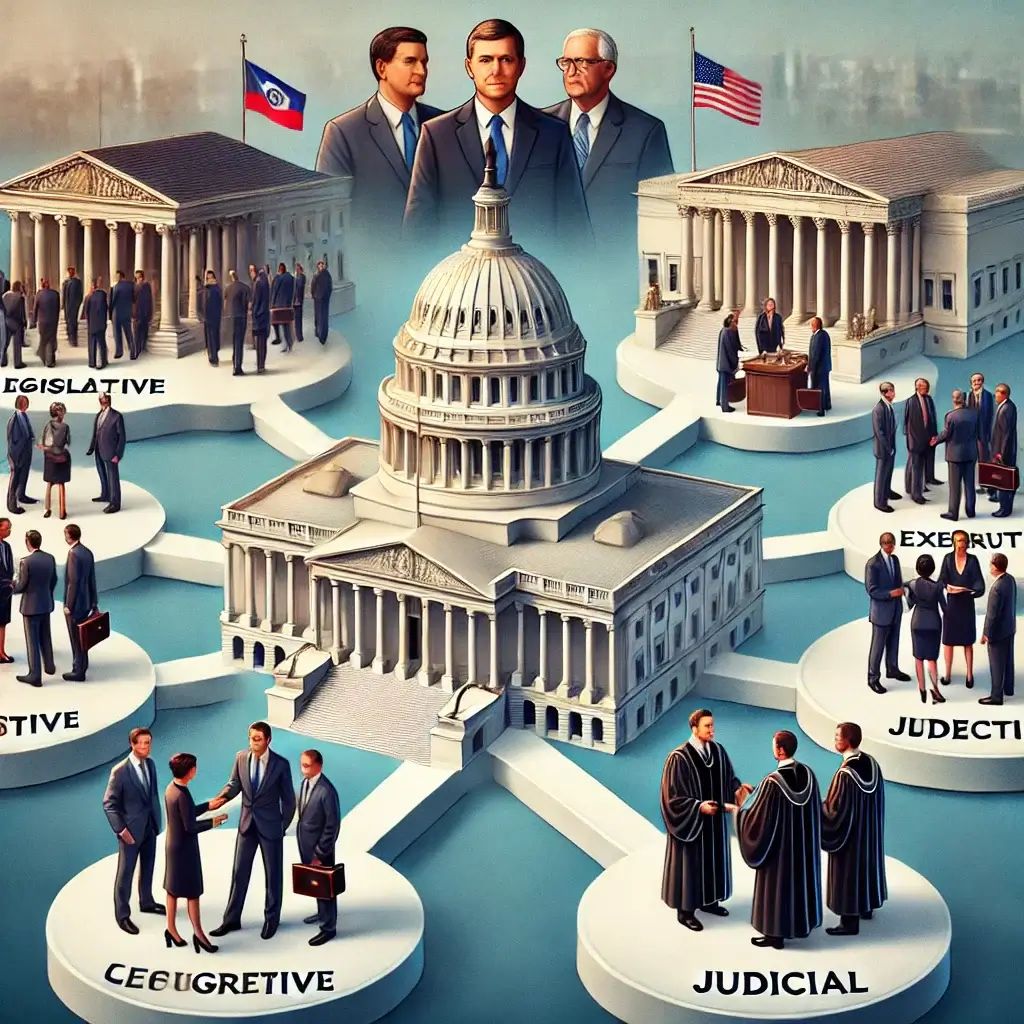Lobbyists have a significant role in the way governments function, particularly in countries such as the United States. The question is: do lobbyists exert influence among all three branches of government? why or why not? It is a reasonable question because the government consists of three components—the legislative, executive, and judicial branches—and each of them has its own function. In this article, we'll explore how lobbyists engage with these branches, whether they actually have influence over them, and why their influence may vary from one branch to another. By the time you finish reading, you'll have a solid understanding of how lobbying influences decision-making.
What Are Lobbyists and What Do They Do?
Before we answer do lobbyists exert influence among all three branches of government? why or why not?, let's begin with the fundamentals. Lobbyists are individuals employed by companies, organizations, or interest groups to promote their ideas to lawmakers and other government officials. What's their mission? To influence laws, policies, or decisions that will benefit the people they work for. They could represent large corporations, environmental organizations, unions, or even small industries.
Lobbying is not new—it's been around forever—but it's become more organized and professional with time.
Lobbyists try to do all sorts of tricks to get what they want. They meet with legislators, provide information, contribute to campaigns, or even pen drafts of bills. Does that mean they have control? Let's analyze by examining each area of government and asking: do lobbyists exert influence among all three branches of government? why or why not?
H2: Lobbyists and the Legislative Branch
The legislative branch—Congress in the U.S.—is where laws get made. It’s got the House of Representatives and the Senate, and it’s no secret that lobbyists love this place. So, do lobbyists exert influence among all three branches of government? why or why not? When it comes to the legislative branch, the answer is a big yes. Why? Legislators require information to make a decision, and lobbyists are more than willing to offer it. They'll deliver research, statistics, or even complete bill proposals. For instance, an organization such as the National Rifle Association (NRA) will lobby vigorously to prevent gun control legislation, while green groups advocate for cleaner energy regulations. Lobbyists also donate money to campaigns to assist legislators in getting elected.
Once elected, those legislators tend to feel a little pressure to hear out the people who got them elected. Consider the health care sector. In 2009, when Congress debated the Affordable Care Act, insurance company and drugmaker lobbyists descended on Capitol Hill. They spent millions to influence the law. Research indicates that in 2022 alone, lobbying expenditure in the U.S. reached more than $4 billion, with the bulk of it being directed towards Congress. Therefore, when we pose the question do lobbyists exert influence among all three branches of government? why or why not? . The branch where they excel is the legislative branch. H3: Why Lobbyists Shine in Congress Why does this branch experience so much heat from lobbyists? It's easy: politicians get voted in, and voting takes money. Lobbyists provide funding in the form of donations or backing groups known as Political Action Committees (PACs). And Congress enacts laws that impact industries straight-up, such as technology, oil, or agriculture, so those industries need an influence.
As we consider do lobbyists exert influence among all three branches of government? why or why not?, it's easy to see that the legislative branch is their playground.
But it's not all one-way. Lawmakers don't always comply with lobbyists' wishes. Public opinion, media, and their own ideology can push back. Nevertheless, the influence is there, and that's why people continue to ask do lobbyists exert influence among all three branches of government? why or why not?
H2: Lobbyists and the Executive Branch
Then there is the executive branch, which consists of the president, their staff, and all the agencies such as the Environmental Protection Agency (EPA) or the Department of Defense. So, do lobbyists exert influence among all three branches of government? why or why not? Here, the answer is yes, but it's a bit different.
The president may not see lobbyists daily, but their agency heads and advisors do. Lobbyists attempt to influence rules and regulations that are produced by these agencies. For example, once a law is passed, an agency such as the EPA may determine how stringent pollution regulations should be. Oil companies' lobbyists may lobby for relaxed rules, whereas environmental groups campaign for stricter ones. One such case is the Trump administration. Back in 2017, automakers aggressively lobbied to reverse Obama-era fuel efficiency standards. They met with officials, wrote letters, and received some concessions. If we ask do lobbyists exert influence among all three branches of government? why or why not?, the executive branch demonstrates they can make a difference—particularly in agencies. H3: How Lobbyists Access the Executive Branch
How do they accomplish this? Lobbyists tend to have connections. Some were once government employees themselves—a transition referred to as the "revolving door." They are familiar with the personnel, the regulations, and the way to make things happen.
Additionally, the executive branch isn't elected like Congress, so lobbyists target behind-the-scenes meetings and wonkish arguments rather than campaign donations.
Nevertheless, when we look at do lobbyists exert influence among all three branches of government? why or why not?
, their influence here is robust but less showy than in Congress. That being said, the president can disregard lobbyists if they wish. Their agenda frequently originates with voters or party objectives, rather than interest groups. So, the influence is there, but it's not complete domination. H2: Lobbyists and the Judicial Branch Now, the judicial branch—the courts, the Supreme Court—is more difficult. Do lobbyists exert influence among all three branches of government? Why or why not? That's where things get cloudy, and the answer is no, at least not outright. Judges are not elected, and they are supposed to remain impartial. Lobbyists cannot simply enter a courtroom and offer a briefcase of money.
But that doesn't mean they can't do anything.
They attempt to sway the judicial branch in underhanded manners.
A large strategy is submitting "amicus briefs"—briefs from outside parties that make the case for one side of a case. In large Supreme Court cases, such as those on abortion or gun rights, many of these briefs accumulate from lobbyists and special interest groups. For instance, in the 2010 case of Citizens United, which altered campaign finance regulations, lobbyists and special interest groups bombarded the court with arguments. The court's ruling benefited big money for politics—something the lobbyists enjoyed. Therefore, when we wonder, do lobbyists exert influence among all three branches of government? why or why not?, they do play a role in the judicial branch but indirectly. H3: Why the Judicial Branch Is Different Why do lobbyists not rule supreme here? Judges are appointed for life to the federal courts, so they don't require campaign contributions or votes. They are there to uphold the law, not public sentiment or special interest groups.
Even so, lobbyists can influence who gets appointed a judge in the first place.
They urge the president and Senate to select individuals who have a tilt in their direction.
When we consider do lobbyists exert influence among all three branches of government? why or why not?
It's the hardest nut to crack.
But get real: the minute judges are in, it's hard to influence them. Their rulings may coincide with lobbyist objectives at times, but the judges aren't taking orders for crying out loud. The impact is there, just less tangible.
H2: Comparing the Three Branches
So, do lobbyists exert influence among all three branches of government? Why or why not? Let's compare them side by side. The legislative branch is where lobbyists have the most muscle—laws touch everybody, and elections keep legislators bound to money and favors. The executive branch gets a feel, too, particularly in agencies where rules get honed. The judicial branch? It's the weakest link for lobbyists, with influence confined to briefs and appointments.
Why the distinction? Every branch is set up differently. Congress requires votes and money, the executive operates on policy and relationships, and the judiciary values autonomy. When we pose the question Do lobbyists hold sway over all three branches of government? Why or why not?, the "why" reduces to how each branch operates.
H3: What Governs Lobbyist Influence
Lobbyists don't always get their way. Legislation such as the Lobbying Disclosure Act requires them to report what they're doing. Public outcry can frighten politicians away too. And in court, judges can simply say no. So, while do lobbyists exert influence among all three branches of government? why or why not? is a "yes" in general, it's not a blank check.
H2: Why This Matters to You Why should you care about Do lobbyists have power over all three branches of government? Why or why not? Because it has an impact on your life. Laws regarding healthcare, taxes, or the environment don't suddenly materialize—these actors mold them. If lobbyists get too aggressive with the big corporations, ordinary folks could get overlooked. Conversely, unions or nonprofits leverage lobbying to battle for workers or the earth. The argument isn't cut and dried. Some believe lobbyists are simply a part of democracy—everyone has a voice. Others believe they drown out the little guy. When we ask Do lobbyists have influence on all three branches of government? Why or why not?, it's really a question of who's in charge. So, do lobbyists exert influence among all three branches of government? why or why not? Yes, but it's different everywhere. They have the strongest influence in Congress, a good grip on the executive branch, and a tenuous, indirect grip on the courts. Why? Because every branch has its own rules, objectives, and pressures. Lobbyists are experts at manipulating the system, but they don't always succeed. The next time you read or hear about a new regulation or statute, consider who stands behind it. The answer to Do lobbyists have influence with all three branches of government? Why or why not? reveals they're a large part of the picture—just not the entire picture.
1.Do lobbyists exert influence among all three branches of government? Why or why not?
Yes, lobbyists have influence on all three branches of government because they promote policies that are in the interest of their clients or industries. In the legislative branch, lobbyists are closely associated with lawmakers, offering research, bill drafting, and influencing them to vote for their interests. In the executive branch, lobbyists aim at regulatory agencies to influence policy enforcement and implementation. In the judicial branch, lobbyists affect court cases by filing amicus curiae briefs and by advocating for judicial appointments favorable to their interests. This pervasive influence enables lobbyists to affect government decisions at various levels.
2. How do lobbyists influence the legislative branch of government?
Lobbyists exert influence on the legislative branch of government by meeting with lawmakers, providing expert testimony, and contributing to political campaigns. They help draft legislation that aligns with their clients' goals and work to persuade legislators to support or oppose specific bills. Since Congress relies on industry expertise, lobbyists use research and data to frame issues in a way that benefits their interests. Do lobbyists exert influence among all three branches of government? Why or why not? Yes, and their function in the legislative process is one of the most direct and powerful means they have of influencing public policy.
3. Can lobbyists influence the executive branch, and if so, how?
Yes, lobbyists do affect the executive branch by cooperating with regulatory bodies and executive personnel to influence the implementation of policies. Lobbyists lobby for executive orders, regulations, and rules that favor their sectors. Lobbyists also participate in advisory committees and offer opinions on suggested regulations. Do lobbyists exert influence among all three branches of government? Why or why not? The executive branch enforces laws, so it is important for lobbyists to influence the way policies are implemented in order to attain their goals.
4. How do lobbyists influence the judicial branch?
Lobbyists influence the judicial branch by contributing to legal advocacy organizations, endorsing judicial candidates, and submitting amicus curiae (friend of the court) briefs in important cases. These briefs present legal arguments that can influence judicial opinions to favor lobbyists' interests. Also, lobbying organizations can support or oppose judicial nominees depending on their position on critical issues. Do lobbyists exert influence among all three branches of government? Why or why not? Yes, since court decisions create legal precedents that can affect industries and policies for decades.
5. Why is lobbying considered controversial in government?
Lobbying is considered controversial because it brings fears of undue influence, corruption, and unequal access to decision-makers. Critics also contend that the rich interest groups have disproportionate influence over public policy, usually to the detriment of common citizens. Nevertheless, their defenders assert that lobbying is intrinsic to democracy in that it gives different groups opportunities to make representations to the government. Do lobbyists exert influence among all three branches of government? Why or why not? Indeed, this pervasive influence gives rise to arguments over transparency, ethics, and the influence of money in politics.




